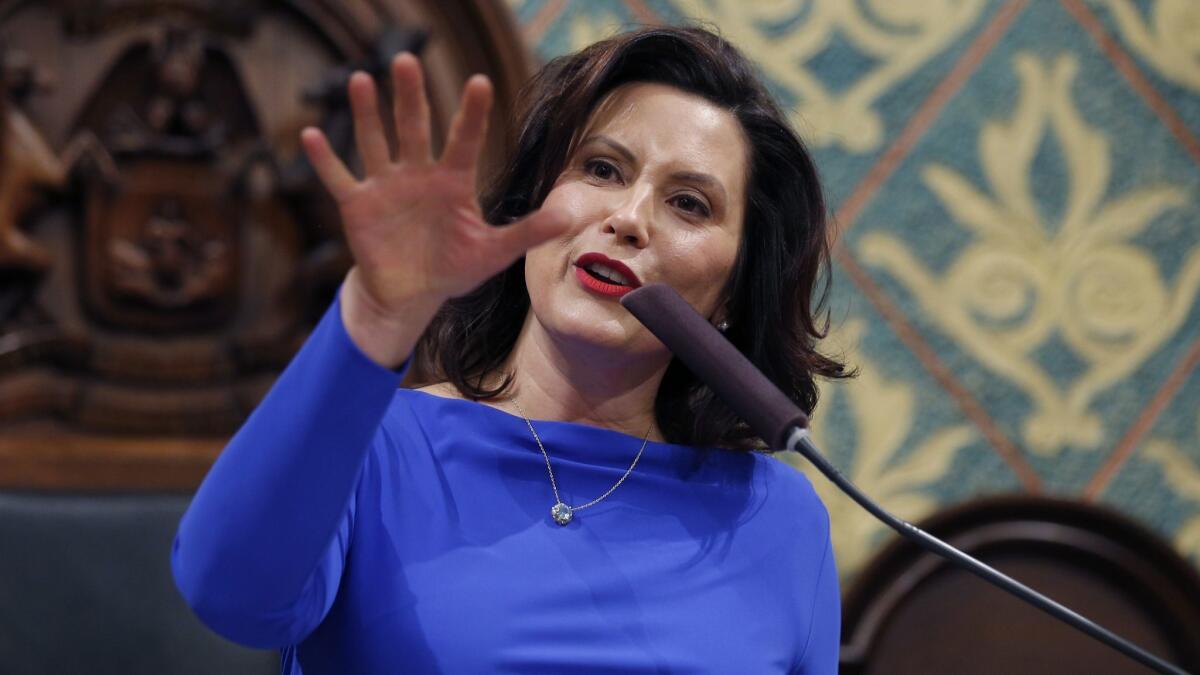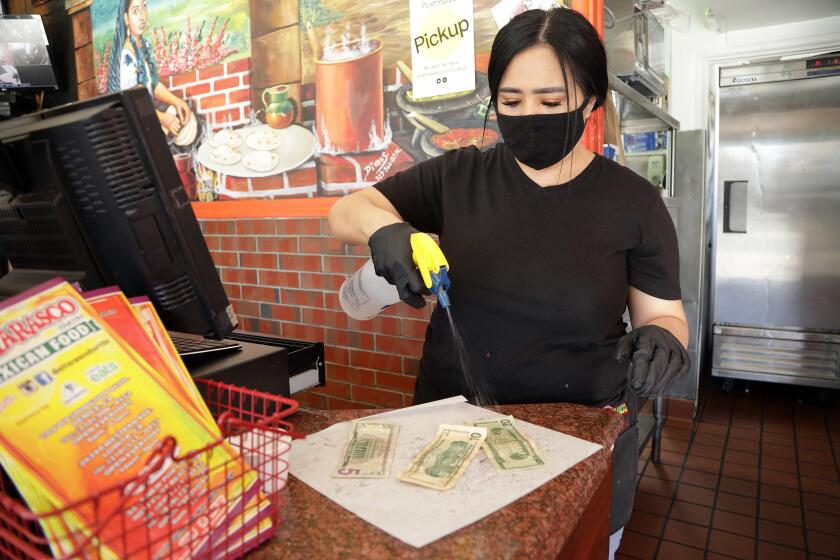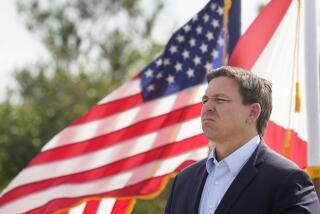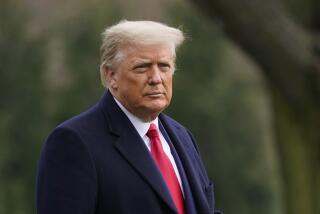Governors shrug off Trump’s insults as they plead for federal aid

- Share via
WASHINGTON — Wary of President Trump’s criticism that they were ungrateful for his management of the coronavirus crisis, governors of several of the hardest-hit states sought gingerly Sunday to avoid provoking him anew and risk losing desperately needed federal aid.
Despite the drastic shutdown of much of the country, Dr. Anthony Fauci, the government’s top infectious-disease specialist, warned Sunday that 100,000 to 200,000 Americans might die before the pandemic eases. More than 2,400 had died as of Sunday.
Several governors made clear they fear inadvertently harming their own citizens if they are too strident in demands for desperately needed medical supplies, or if they clash too publicly with Trump over pandemic policy as the contagion spreads.
So they took a new tack, articulating their states’ needs while ignoring Trump’s insults and demands.
Michigan Gov. Gretchen Whitmer — who Trump has derided on Twitter as “half-Whit” — touted her cooperative relationship with Vice President Mike Pence, who heads the White House coronavirus task force, and with the Federal Emergency Management Agency.
“It’s gotta be all hands on deck — we shouldn’t be fighting one another; we need to be fighting COVID-19 together,” Whitmer said on CNN’s “State of the Union,” referring to the disease caused by the coronavirus.
“I don’t have the energy to respond to every slight,” she added.
Washington Gov. Jay Inslee, also the object of Trump’s withering remarks, sought to turn the other cheek and focus on his state’s needs and his “good partnership” with federal authorities.
“We’re not distracted by some of the noise out of the White House,” he said on CNN.
With cities and states pleading for federal help to obtain critically needed medical supplies and complaining that Trump has moved too slowly, tensions have grown between the White House and the governors.
On Friday, Trump openly criticized governors who were reluctant to praise his leadership and suggested their states could suffer as a result.
“When they’re not appreciative to me, they’re not appreciative to the Army Corps, they’re not appreciative to FEMA, it’s not right,” Trump told a White House briefing on Friday. He said he had advised Pence not to call the governors of Washington, which saw the first major outbreak of COVID-19, and Michigan.
“I say, ‘Mike, don’t call the governor of Washington. You’re wasting your time with him,’” Trump said, referring to Inslee.
“‘Don’t call the woman in Michigan,’” the president added, referring to Whitmer.
The White House nonetheless on Saturday approved Michigan’s request for an emergency declaration, freeing up federal aid.
Another case study in Trump’s tense dealings with governors emerged Saturday, when the president said he was considering putting parts of New York, New Jersey and Connecticut under enforced quarantine. New York City is the nation’s infection epicenter, at least for now.
None of the three Democratic governors involved was consulted beforehand; not even New York Gov. Andrew Cuomo, who had spoken with Trump earlier in the day.
After hearing of the proposed tri-state quarantine, Cuomo warned it would amount to a federal “declaration of war” on the states and would paralyze the region’s already battered economy. Trump then dropped the idea, and a travel advisory was issued instead, telling people in the area to stay home.
Los Angeles Times’ visual coverage of the coronavirus crisis
Fauci, who directs the National Institute of Allergy and Infectious Diseases and is a member of the White House coronavirus task force, made plain Sunday that Trump —who frequently cites his hunches over scientific advice — had to be talked out of the proposed quarantine.
“We made it clear, and he agreed, it would be much better to do what’s called a ‘strong advisory,’” Fauci said on CNN. Trump’s enforced quarantine would have created “a bigger difficulty,” he said.
New Jersey Gov. Phil Murphy, interviewed on ABC’s “This Week,” did not mention being blindsided by Trump’s proposal, merely observing that the travel advisory that was ultimately announced would serve the same purpose.
Then he pivoted to his state’s top priority: obtaining ventilators and respirators to help overwhelmed hospitals deal with critically ill patients.
Among the governors, not all praise or criticism of Trump breaks down along party lines. Many governors from both parties have urged him to use the Defense Production Act to order private companies to turn their manufacturing ability to making medical supplies.
There have also been bipartisan calls for Trump to order federal authorities to find and distribute existing medical supplies for states. Earlier this month, the president batted aside such calls, saying the federal government is “not a shipping clerk.”
Another confrontation between governors and the White House is likely looming over how quickly to ease isolation measures in order to get the economy up and running again by Easter, as Trump has said he wants. GOP governors are unlikely to act as a bloc in supporting an accelerated timetable.
Maryland Gov. Larry Hogan, a Republican, said Sunday he didn’t “see any way that we’re going to be opening back up in a couple weeks.” Hogan said the outbreak was likely to get much worse in his state before it gets better.
“I think in two weeks, around Easter, we’re going to be looking a lot more like New York,” he said on “Fox News Sunday.”
To the president’s defenders, highly personal attacks on governors amount to little more than Trump’s customary pugilistic style, however jarring it may be in the midst of illness and death.
Others around the president suggest that states’ interests are not at serious risk, even when the president angrily vents at governors he dislikes.
Fauci, asked about Trump’s implied threats against governors who are not “appreciative” enough, said it was important to distinguish between inflammatory language and actions.
“There’s the reality, and the rhetoric,” he said. “I think the reality is that the people who need things will get what they need.”
For his part, Trump appeared focused on other concerns Sunday, at least on Twitter.
In tweets, he praised his televised coronavirus briefings as a “ratings hit” and said the United States would not pay for security for the Duke and Duchess of Sussex, Harry and Meghan, who have reportedly moved from Canada to Southern California.
Later Sunday, the couple issued a statement saying they had “no plans” to ask the U.S. for pay for their security detail and that “privately funded arrangements” had already been made.
More to Read
Get the L.A. Times Politics newsletter
Deeply reported insights into legislation, politics and policy from Sacramento, Washington and beyond. In your inbox twice per week.
You may occasionally receive promotional content from the Los Angeles Times.










